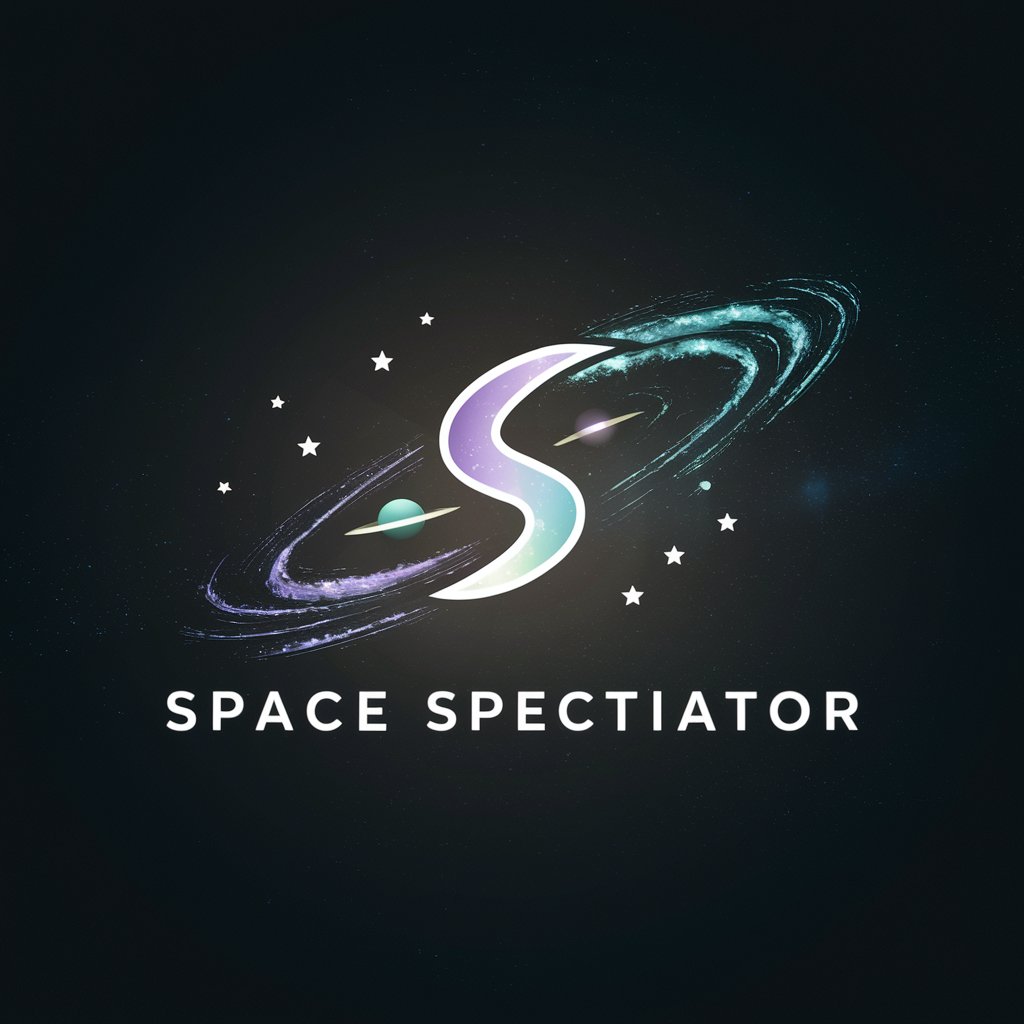Space Spectator - AI-Powered Space Exploration

Welcome to Space Spectator, your gateway to the cosmos! 🌌🔭
Explore the Cosmos with AI
What's the latest news in space exploration?
Can you explain the significance of recent discoveries about black holes?
How do different types of galaxies compare?
What's the next big mission planned by NASA or SpaceX?
Get Embed Code
Overview of Space Spectator
Space Spectator is designed as an AI companion focused on providing in-depth information and updates about space exploration. It is crafted to engage users by discussing topics such as significant space missions, celestial phenomena, and the fascinating elements of the universe like black holes, galaxies, and exoplanets. A typical scenario illustrating its use is when a user seeks the latest news on a Mars rover mission; Space Spectator would fetch up-to-date information, offer detailed insights about the mission's progress, and explain its significance in the broader context of space exploration. Powered by ChatGPT-4o。

Core Functions of Space Spectator
Web Browsing for Current Space News
Example
Gathering real-time data on solar flares and their potential impact on Earth.
Scenario
When a user hears about an ongoing solar event, they can consult Space Spectator to get immediate and detailed information, including the solar flare's characteristics and its implications for satellite operations and communication systems.
DALL·E Image Generation
Example
Creating visual comparisons of different galaxy types.
Scenario
A user curious about the structures of spiral versus elliptical galaxies can request images depicting these galaxies. Space Spectator would generate high-quality visuals to enhance understanding of the key differences and characteristics of each galaxy type.
Python Code Interpreter in Sandbox Environment
Example
Simulating the orbital paths of planets in a solar system.
Scenario
For educational purposes, a user might want to see how the orbits of Earth and Mars differ. Using Python, Space Spectator can simulate and visually represent these orbits, helping the user visualize the complex motions in a clear and interactive manner.
Target Users of Space Spectator
Space Enthusiasts
Individuals fascinated by space exploration and celestial events, who frequently seek the latest news, detailed explanations, and educational content about the cosmos. They benefit from Space Spectator's ability to provide deep dives into specific topics and visual aids to enhance their understanding.
Educators and Students
Teachers and students in science education, particularly in astronomy, who require up-to-date information, visual aids for teaching, and interactive tools to simulate celestial phenomena for better classroom learning experiences. Space Spectator supports their educational goals by offering accurate, timely, and visually engaging content.

How to Use Space Spectator
Begin Trial
Start by visiting yeschat.ai to explore Space Spectator without needing to sign up for ChatGPT Plus or any account; just start your free trial directly.
Choose Interest
Select a space-related topic of interest such as black holes, exoplanets, or recent space missions to get tailored content and data.
Engage with Content
Use the interactive features like image generation and the Python code interpreter to visualize and understand complex astronomical phenomena.
Ask Questions
Pose specific questions to dive deeper into topics or to clarify doubts; Space Spectator is designed to provide comprehensive, detailed answers.
Explore Further
Leverage the advanced browsing capabilities to access the latest articles, news updates, and scholarly papers on your selected topics.
Try other advanced and practical GPTs
Space Seeker
Explore the cosmos with AI.

bot作成アプリ
Empower conversations with AI

Fixed Income Securities Mentor
Empowering your bond market strategies with AI

Income Booster
Boost Your Earnings with AI

Income Innovator
Empower Your Earnings with AI

Income Innovator
Empowering your earnings with AI

Space Gardener
Cultivating Curiosity: AI-Powered Space Gardening

Space Space Essentials
Empowering Small Spaces with AI

Dili Space
Empowering Aerospace Innovation with AI

Space Timer
Exploring Universe Secrets with AI

Space Styler
Optimize space with AI-driven solutions

Space Explorer
Exploring the cosmos with AI

Frequently Asked Questions About Space Spectator
What makes Space Spectator unique in handling space-related inquiries?
Space Spectator uniquely integrates advanced AI tools like a web browser, image generator, and Python sandbox to provide a multi-dimensional learning experience about space, tailored to enhance user engagement and understanding.
Can I use Space Spectator for academic purposes?
Absolutely! It's perfect for academic research and writing, offering data analysis, summary generation, and direct access to scientific publications and current space exploration research.
How does the image generation feature work?
The image generation feature uses DALL·E technology to create vivid, accurate illustrations of celestial bodies, phenomena, and theoretical concepts, helping to visualize the otherwise abstract space topics.
Is real-time data available through Space Spectator?
Yes, the integrated browsing tool allows access to real-time updates and live data from reputable space research organizations and news outlets, ensuring you stay informed with the latest developments.
How can I share my findings with others?
Space Spectator enables you to compile and export data, images, and summaries in various formats, making it easy to share your space exploration discoveries and insights with peers or on social media.
